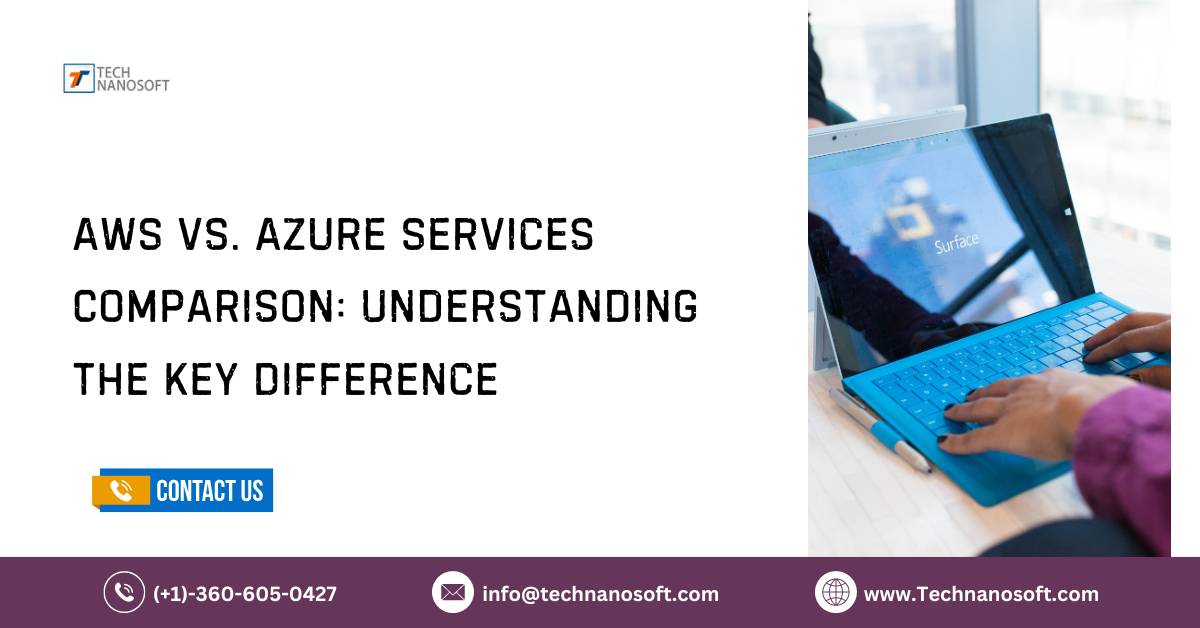AWS vs Azure Services Comparison: Understand The Key Difference

Starting in 2010, Microsoft's Azure Cloud Service revolutionized the hosting and management of applications in the digital world. Azure is the foundation of current business operations. It has a full set of tools and the best scalability available. Businesses worldwide choose it due to its seamless integration with Microsoft products and ease of integration with their environment.
With a focus on dependability, security, and new ideas, Azure gives businesses the confidence to start their digital change journey. From small businesses to the Fortune 500, Azure keeps changing what's possible with cloud computing, which helps all kinds of industries grow and work more efficiently.
On the other hand, Amazon created Amazon Web Services (AWS), a wide range of services and global infrastructure that revolutionizes cloud computing, enabling businesses to grow and generate new ideas at unprecedented speeds.
What is Azure?
Microsoft Azure, the most popular open-source cloud tool, allows developers to easily move and store their apps in the cloud. Azure's powerful set of tools makes it easier to create, host, manage, and store data. It also takes care of server, database software, and operating system maintenance, so users don't have to. Using Microsoft's data centers, Azure hosts web applications quickly over the internet.
It has many database choices, such as SQL, MySQL, and Cosmos DB, so it can meet a wide range of needs. Azure gives you the flexibility and scale of cloud computing, which speeds up your development processes and improves your digital infrastructure. Use Azure to take your business to new heights.
What is AWS?
AWS is the best platform for secure cloud services, letting application providers, ISVs, and vendors run their apps safely. AWS makes it easy for businesses to grow and scale by providing services like computer power, content delivery, and database storage. RDS and DynamoDB take care of storage needs, and Elastic Compute Cloud makes it easier to do computations.
The convenient Simple Storage Service takes care of storage. It's easy to get to AWS's application hosting platform, whether you use the well-documented web services APIs or the easy-to-use AWS Management Console. AWS, the leader in stability and innovation in cloud computing, can help your business reach new heights.
Difference Between AWS and Azure Services
Scalability and Flexibility
Amazon Web Services (AWS) was one of the first companies to use cloud computing. Businesses with diverse needs can utilize its wide range of services. AWS gives businesses of all kinds unmatched flexibility and scalability through its wide range of services. AWS has a complete ecosystem that includes everything from computing power to storage options, and more.
This ecosystem aims to facilitate businesses' innovation and success in the digital realm. With a strong infrastructure and a huge global network, AWS guarantees reliable performance and easy expansion, making it the top choice for businesses looking for cutting-edge cloud solutions.
Microsoft Azure is a strong competitor in the cloud computer market. It offers a wide range of specialized services and is very good at scaling. Azure's focus on highly customized services tailored to each business's needs sets it apart, even though it is just as scalable as AWS. Azure gives businesses access to a wide range of services, including AI, IoT, and more.
This lets them use cutting-edge technologies to boost growth and innovation. Even though Azure might not offer as many services as AWS, its focus on specialization makes it easy for businesses to find exactly what they need to reach their goals, making it a strong contender in the cloud market.
Cost Optimization
Amazon Web Services (AWS) offers a wide range of powerful cloud solutions for companies. However, its pricing structure is complicated, and businesses need to be very careful to get the best deals. AWS provides you with options by offering a wide range of services and pricing plans, but it can also make things more difficult.
To effectively manage costs, companies must closely monitor their usage and employ effective tools and methods. By understanding how AWS pricing works, businesses can make smart choices that maximize value while minimizing wasteful spending.
Microsoft Azure has more straightforward prices, which makes it easier for businesses to make budgets and plans for their spending. Even though Azure's upfront costs may be a little higher than those of its rivals, the company's clear pricing model helps businesses plan ahead, avoiding surprises and making money management easier.
With stable prices and clear spending predictions, businesses can allocate their resources and concentrate on innovation and growth, unhindered by complex billing structures. Azure's approach to clarity and simplicity gives businesses the tools they need to make smart choices that improve efficiency and return on investment (ROI) in the cloud.
Safety Features
Strong security measures are important to both Amazon Web Services (AWS) and Microsoft Azure. To protect private data, they offer encryption, access controls, and compliance certifications. Businesses can successfully lower security risks by using encryption protocols to keep data private and secure, as well as by controlling who has access to specific data. Additionally, both platforms follow strict industry rules and keep up-to-date compliance certifications, which gives businesses in heavily controlled areas peace of mind.
It's important to think about your individual security needs and industry rules when choosing between AWS and Azure. AWS might have more compliance certifications, but Azure's ability to work with Microsoft's security environment could be helpful for businesses that already use Microsoft products. In the end, picking the right cloud provider depends on making sure that the security features match the needs of the company and the rules set by regulators. This will provide a strong defense against new cyber threats.
Existing Infrastructure
Amazon Web Services (AWS) is great for hybrid cloud deployments because it makes it easy for businesses to combine on-premises technology with cloud resources. Strong solutions like AWS Outposts and AWS Hybrid Cloud let businesses move their current infrastructure to the cloud without any problems, maintaining control and stability across environments.
This adaptability lets companies use the cloud's scalability and agility while protecting their investments in on-premises systems. This makes the switch to hybrid cloud design easy.
Microsoft Azure Businesses that use a lot of Microsoft goods will find Azure to be a natural fit. Tools like Active Directory and Office 365 work together without any problems. This native integration lets businesses use their current investments and knowledge, which makes moving to the cloud easier and improves the efficiency of their operations.
Microsoft's ecosystem and Azure's full set of services work together to give businesses that already use Microsoft tools a smooth experience. This makes Azure a good choice for adopting the cloud without any problems.
Focus and Expertise
Amazon Web Services (AWS) has a lot of different services and solutions for businesses that need help with computing, storage, machine learning, and the Internet of Things (IoT). Startups, small and medium-sized businesses (SMBs), and large companies can use it for flexible and affordable cloud solutions that support growth and innovation. With its wide range of tools, AWS makes it possible for businesses in many fields to use cloud technology successfully.
AWS has the technology and services you need for success, whether you're using it for development, testing, or production. Its pay-as-you-go pricing model makes it affordable and easy for businesses of all sizes to use, solidifying its place as the world's leading cloud platform.
Microsoft Azure works great with other Microsoft goods and services, which makes it a great choice for businesses that have a lot of investments in the Microsoft ecosystem. Azure provides a seamless cloud experience by being fully compatible with tools like Active Directory, Office 365, and Windows Server. This makes operations run more smoothly for companies that use Microsoft technologies.
Azure also offers powerful data analytics solutions that help businesses learn useful things from their data and make smart decisions. Because of this customized integration and Azure's strong infrastructure, it is the best cloud platform for businesses that want to get the most out of their current investments and use cloud technology successfully.
Comparisons Between Microsoft Azure vs AWS?
1. The visuals on AWS's layout are bright and beautiful, making it a pleasure to use. Azure, on the other hand, chooses to consolidate, putting all of its information in one place that is easy to get to. AWS might be more colorful, but Azure's centralized method makes it easier to navigate, so users can find what they need quickly and without having to deal with extraneous stuff.
Both AWS and Azure provide options that align with a variety of workflows and goals, regardless of your preference for a visually appealing or simple interface.
2. Azure and AWS handle security in different ways. Azure enhances security by granting rights to the entire account, which is a more comprehensive way to control who can do what. On the other hand, AWS employs distinct roles and specific permission rules to tailor security measures to each user's role and responsibility.
Both platforms put security first, but they do so in different ways. Users can choose the method that best fits their security needs and operational tastes. Azure and AWS both have strong security features that can keep your data and resources safe, whether you care more about overall account security or fine-grained permission controls.
3. When it comes to documents, AWS and Azure do things in different ways. AWS has a lot of documentation that goes into great depth about all of its services and features. On the other hand, Azure works on being search-friendly, which makes it easier for people to find what they need quickly.
While AWS's detailed documentation gives users in-depth knowledge, Azure's search-friendly method makes it easier to find information, which is good for users who value speed and ease of access. Both AWS and Azure make sure that users have the tools they need to get around their cloud environments easily and get the most work done, whether they like full documentation or a simple search function.
4. People often perceive AWS as more intuitive than Azure when it comes to ease of use. AWS makes cloud computing easier for people of all skill levels by having an easy-to-use interface and simple access. However, different users may have different preferences, and depending on their experience and use case, Azure may be just as easy to use for some as it is for others.
In the end, how intuitive each site seems to different people may depend on their own experiences and preferences. Regardless of whether you care more about features or how easy they are to use, both AWS and Azure have easy-to-understand interfaces that make managing and optimizing the cloud simple.
5. Both Azure's Virtual Network Cloud and AWS's Virtual Private Cloud (VPC) operate in separate, isolated environments for networking and resource management in the cloud. While Azure's Virtual Network Cloud has powerful networking features that are specific to Azure, AWS's VPC has similar features that are specific to the AWS setting.
Both options let users build secure, scalable network architectures that make it easier for people to communicate and share resources in the cloud. You can use these networking features to build flexible and reliable cloud platforms that meet your business needs and goals, no matter if you choose Azure or AWS.
6. Azure has 140 availability zones compared to AWS's 61, which gives you a lot of options for spreading out resources and making sure they are always available. These availability zones are physically separate places in an area that offer redundancy and fault tolerance to lessen the impact of any problems that might arise.
Both Azure and AWS put a lot of emphasis on dependability and resilience, but Azure may be better for people who want the most redundancy and disaster recovery options. Using availability zones, whether you choose Azure or AWS, makes your cloud system more resilient and makes sure that you can always access important services and resources.
READ ALSO- Why Application Monitoring Is Important For Business Success?
Is AWS Better than Azure?
Market Share
Amazon Web Services (AWS) is well-known, but Microsoft Azure has quickly moved up in the market, as shown by its impressive income growth. Even though AWS is a well-known name, Azure's quick entry into the market shows Microsoft's plan and investment in cloud services. This intense competition leads to new ideas and improvements in cloud technologies, which are good for customers.
Whether you care more about brand reputation or fast market growth, both AWS and Azure have competitive benefits that can meet the needs of a wide range of businesses and shape the future of cloud computing. Businesses can make smart choices about whether to use AWS or Azure for their cloud options when they understand these market dynamics.
Revenue vs. User Base
AWS makes the most money, which shows that it is the market leader in cloud computing. On the other hand, Microsoft Azure has a larger user base, indicating that many companies and organizations use it. While revenue shows how well a business is doing financially, a bigger user base shows how appealing Azure is to a wide range of users, such as developers, small and medium-sized businesses, and enterprises.
Both measures show what AWS and Azure do well in different ways, highlighting their unique market positions and strategies. With this knowledge, companies can compare how well AWS and Azure do financially and how many users they can reach. This helps them choose the best cloud provider for their needs.
PaaS and Windows Integration
Microsoft Azure is the best option for strong platform-as-a-service (PaaS) tools that work well with Windows environments. Azure offers a complete set of PaaS services and is fully compatible with Microsoft technologies, making it an ideal environment for creating, deploying, and controlling apps.
Because it works so well with Windows infrastructure, companies that use Microsoft products can make the switch without any problems. This increases operational efficiency and productivity. Azure is a great tool that you can customize to fit your business's needs and goals, whether you need scalable PaaS solutions or seamless Windows integration. It lets companies innovate and grow in the cloud.
Salary Azure AWS Comparison
Because of the high demand for AWS skills in the job market, professionals who know how to use Amazon Web Services (AWS) tend to earn a little more than professionals who know how to use Microsoft Azure. The cloud computing business is very competitive.
AWS professionals make an average of 6.3 lakh per year, while Azure professionals make about 6.1 lakh per year. Despite this, both AWS and Azure present promising career opportunities, with demand anticipated to increase as more businesses adopt cloud technologies. Whether you specialize in AWS or Azure, cloud computer skills can lead to good job opportunities and competitive pay in today's fast-growing tech industry.
Accessibility and Learning Ease
Amazon Web Services (AWS) gets praise for making its literature easy to find, which makes it easier for users to learn and find their way around. This ease of access helps both new and experienced workers use AWS, which leads to better skill development and cloud computing proficiency.
Even though Microsoft Azure is growing quickly and has a lot of features, some users find AWS's instructions to be easier to understand and more complete, which makes the learning curve shorter. AWS's easy-to-find documentation is a great way for people who are new to cloud computing or professionals who want to improve their skills to learn cloud technologies and improve their job chances in the competitive tech industry.
Utilizing Simple Storage Service (S3)
Amazon Web Services (AWS) uses Simple Storage Service (S3) as its main storage service because it provides reliable, scalable object storage for a wide range of uses and apps. S3 is a key part of AWS's storage services because it is easy to use and flexible. It lets businesses store and access data safely and affordably.
S3 offers complete data management tools, including versioning, encryption, and lifecycle management. These tools help businesses make the best use of their storage resources and simplify their processes. You can store website content, backups, or application data on Amazon Web Services' robust and expandable S3 cloud storage service.
Aws vs. Azure vs Google Cloud
Google Cloud Platform (GCP)
Google's GCP stands for "Google Cloud Platform." It is a set of cloud managed service work. It offers infrastructure as a service (IaaS), platform as a service (PaaS), and software as a service (SaaS), which let people use Google's infrastructure to build, deploy, and run apps and services.
GCP provides a wide range of services, such as computing, storage, databases, machine learning, networking, and more. It focuses on new ideas, being able to grow, and being reliable. It has data centers all over the world to ensure users have low latency and high uptime.
Amazon Web Services (AWS)
Amazon Web Services, or AWS, is a tool for cloud computing that Amazon.com offers. The services that AWS provides are very varied and include computer power, storage, databases, machine learning, AI, analytics, and many more.
It works with companies of all kinds, from small startups to large corporations, and offers cloud infrastructure that is both flexible and scalable to handle a wide range of workloads and applications. AWS is known for being reliable, safe, and present all over the world. AWS distributes its data centers globally to ensure users can access fast and reliable services.
Azure
Microsoft created Microsoft Azure, a tool and service for cloud computing. The cloud services it offers are very varied and include computing, storage, databases, networking, analytics, AI, and many more. Azure lets people use Microsoft's infrastructure and tools to build, launch, and manage services and apps.
It works well with Microsoft products like Windows Server, Active Directory, and Office 365, which makes it a good choice for companies that already use Microsoft products. Azure focuses on its hybrid cloud features, which let businesses easily combine on-premises and cloud environments to get more freedom and efficiency.
Key Tools For AWS vs. Azure vs Google Cloud
Compute
Compute Engine (GCE) from GCP provides scalable virtual machines (VMs) of different machine types that can run custom apps and workloads in the cloud. GCE offers performance and flexibility with a number of boot choices, making it perfect for businesses that need reliable VMs to meet their computing needs.
The Elastic Compute Cloud (EC2) from AWS offers many types of virtual machine instances, such as on-demand, scheduled, spot, and burstable. Users can choose the virtual machine (VM) that best suits their needs and budget, which guarantees system growth and efficient resource use.
Azure virtual machines are easy to use. They let you create and handle Windows and Linux VMs in the cloud. Azure VMs are reliable and flexible for a wide range of computing tasks because they work well with other systems and don't slow down.
Storage
GCP's Cloud Storage offers robust and expandable object storage for storing substantial volumes of data, including backups, files, and user-generated Because of its versatility and affordability, cloud storage serves as a secure method for storing data in the cloud.
You can use Amazon S3 (Simple Storage Service) from AWS for archiving, disaster recovery, and data lakes, among other uses. S3 is a great choice for businesses that need to store and access a lot of different types of data because it is highly durable and available.
For text, pictures, videos, and archives that lack specific organization, Azure Blob Storage provides scalable object storage. With its low prices and easy integration with other Azure services, Blob Storage is a reliable and scalable way to store large amounts of unstructured data in the cloud.
Databases
GCP's Cloud SQL is a controlled relational database service that works with SQL Server, MySQL, and PostgreSQL. Because Cloud SQL hides database handling, developers can focus on making apps while Google takes care of the database infrastructure, making sure it grows as needed and is always available.
Amazon RDS (Relational Database Service) from AWS is a controlled service for setting up, running, and growing relational databases in the cloud. Because it works with many database engines, RDS makes managing databases easier. This lets developers focus on making apps while AWS takes care of the database technology.
If you want to run Microsoft SQL Server databases in the cloud, Azure's Azure SQL Database is the service for you. Azure SQL Database makes database management easier with its built-in intelligence and scale. This lets developers focus on making apps while Microsoft takes care of the database infrastructure.
Serverless Computing
With GCP's Cloud Functions, you can run stateless code without having to manage servers in a serverless setting. Cloud functions are scalable and cost-effective, so developers can focus on application logic without having to worry about managing servers. They are perfect for building and launching event-driven apps.
AWS Lambda is a serverless compute service that lets users run code without having to set up or manage servers. With pay-per-use pricing and automatic scaling, Lambda is both flexible and efficient. This makes it a great choice for creating and launching event-driven apps with little operational overhead.
Azure Functions are a serverless, event-driven computing service that lets you build and run code without having to handle servers. Azure Functions make it easier to build apps by integrating them seamlessly and automatically moving them up or down. This way, developers can focus on business logic instead of managing servers.
Conclusion
Typically, the primary distinction between AWS and Azure services lies in their respective prices, with the perception of Azure being more costly. Both systems offer different cloud configurations and services to meet the needs of different businesses. AWS and Azure dominate the market because they offer powerful features at reasonable prices.
Considerations such as scope, market dynamics, job opportunities, and learning curves are crucial when deciding between the two. It's possible that AWS will become the best choice for businesses that want infrastructure-as-a-service (IaaS) or a full set of tools. In the end, making an informed choice means looking at your business's needs and matching them up with the strengths of each cloud computing company.
FAQs on AWS vs Azure vs Google Cloud
Q.1- What is Azure, and how does it differ from other cloud platforms?
A- MS Azure is their cloud computing platform. It offers many services, such as computing, storage, databases, and more. It works well with Microsoft's ecosystem, making it an excellent choice for businesses that already use Microsoft products.
Q.2- Why should I choose Azure for my cloud needs?
A- Azure is a popular choice for businesses looking for a complete cloud option because it is reliable, scalable, and works well with many Microsoft products.
Q.3- What are some popular Azure services?
A- Azure Virtual Machines is a very popular computing service. Azure Blob Storage is a popular service for object storage. Azure SQL Database is a popular service for controlling databases. Azure Functions is a popular service for serverless computing.
Q.4- How can I begin using Azure?
A- Microsoft provides documentation, tutorials, and training classes on the Azure website and the Microsoft Learn platform to assist users in starting with Azure services.
Q.5- What is cloud computing?
A- Cloud computing is the delivery of computer services over the internet, letting users access resources like storage, databases, and computing power whenever they need to. People can use these services without having to own or handle any physical infrastructure. They only pay for the resources they use.
Q.6- What are the benefits of using cloud computing services?
A- Cloud computing has many benefits, such as the ability to grow, be flexible, save money, be reliable, and provide better security. Businesses can use pay-as-you-go pricing models and change the number of resources they use based on demand. They can also access services from anywhere with an internet link.









